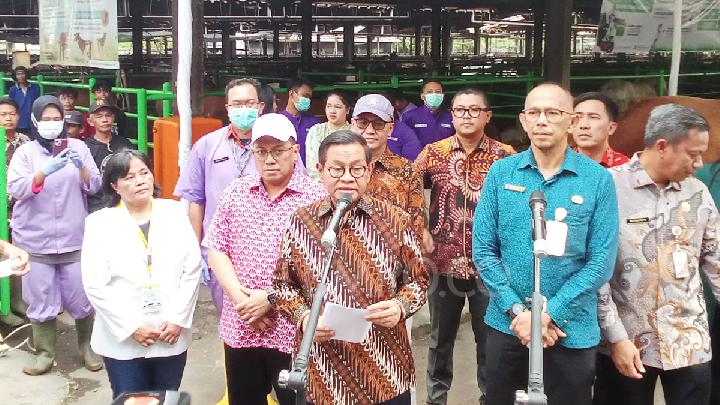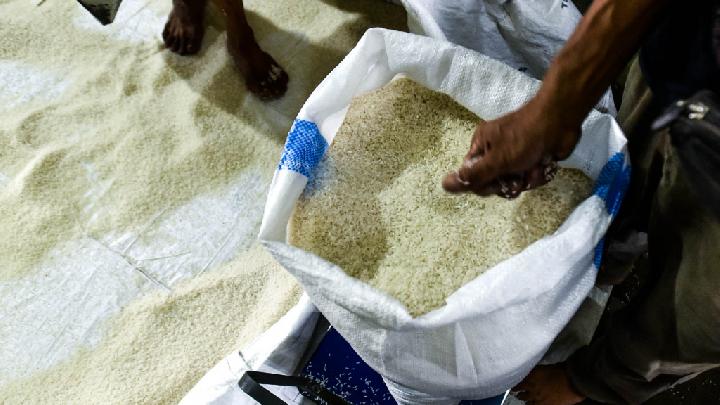TEMPO.CO, Jakarta - In January last year, in a Jabodetabek Commuter Line (KRL) train crossing near Pondok Ranji Station, Ciputat, South Tangerang, Indonesia, there was a "spring bed waste" incident. The journey of six KRL trains containing thousands of people inside was hampered because of it.
Founder and CEO of Jagatera ID, Denny M. Pondiu, 41 years old, said that spring bed waste is indeed included in those that cannot be directly disposed of at the Final Processing Site (TPA), according to Law Number 18 of 2008 concerning Waste Management. He half understands the difficulty of every citizen in maintaining household waste that is no longer used.
Not to mention when the time comes for a major flood cycle. The amount and variety of household waste that needs to be disposed of explodes.
On that basis, Denny saw a business opportunity for a service center for managing unused goods. He initially transformed a building in Pamulang into a storage warehouse. His business has been pioneered since 2017 before finally being established under the name Jagatera in 2020.
"We receive various things, starting from massage chairs, air conditioners, drums, even cats," Deny told Tempo when met at his newest warehouse location located on Jalan Pengetahuan III, Pondok Petir, Bojongsari, Depok City, West Java, May 26, 2025.
From the service he opened, it was also revealed that many residents threw away items just because they were slightly damaged or scratched. In fact, according to this elementary school graduate, there are quite a few items that only need a little repair to be able to function again as before.
"But they rush to throw them away," he said, adding, "Sometimes the reason is, 'my husband bought the wrong one' or 'the refrigerator is too small' or 'the door was measured wrong so the item can't enter the house'."
Every unused item he receives is subject to a management fee. Starting from handling fees, pick-up fees, to car rental fees complete with drivers and couriers.
The amount of the fee varies. For sofas, for example, the price is set at Rp30,000/seater excluding pick-up costs. Meanwhile, spring beds are charged a higher fee. The reason is that the duration of dismantling one mattress is relatively longer: it takes 30-40 minutes to dismantle the wire per mattress.
"Around Rp350,000 for a size of 160x200 around South Jakarta. The average cost of goods of that size is due to pick-up costs," he said.
And, as he had suspected, the business of collecting unused goods skyrocketed during the major floods in Jabodetabek at the end of 2021. Household mattress waste piled up in his warehouse up to 30 units per month.
Not Only Recycle but Also Upcycle
The number of mattresses could not be accommodated in the warehouse in Pamulang. Denny then took the initiative to process dozens of spring bed waste into upcycle products, which is a process of changing unused goods into new products, without the need for a new material manufacturing process.
This is Deny's next business metamorphosis. Denny and his business partner, Aprinto Yuwono, raised the name Jagatera Sustainability Furniture in early 2022.

Recycled and upcycled household waste products produced by Jagatera in its warehouse in Pondok Petir, Depok, West Java, May 26, 2025. Tempo/Sonya Andomo
"Initially, I just wanted to collect unused items, dismantle the wires, then sell them to iron or other material traders, but I saw a different opportunity," he said.
Denny collaborated with sofa and mattress craftsmen around Gudang Jagatera ID to make products through upcycling. Each upcycled spring bed product produced is sold for Rp 1.8-2.0 million depending on the size.
"At first, all upcycled mattresses were bought by residents around Jagatera ID, but then our mattresses were also popular with lodging, homestay, and villa entrepreneurs in Bogor, Depok, and Bekasi," Denny said again while mentioning that Jagatera's turnover has now reached Rp 200 million per month. "Or there is Rp 2 billion in a year," he said.
In addition to carrying out commercial businesses, Jagatera also created a Mimpi untuk Indonesia program through the kitabisa.com platform. Each donor donates a used mattress that will be remodeled and made like new. So, it can be given to 100 scavengers and other waste heroes.
Thus Denny maintained the Outlet Dhuafa program that he had started in 2014, which distributed free used clothes to scavengers and other underprivileged groups. "This was the beginning of my desire to have a social movement," he recalled.
Transformation of Waste Scavengers
Jagatera ID does not only collect unused waste. Recycled waste such as paper, plastic bottles, glass bottles, used clothes are also collected by the team, which mostly consists of scavengers and other underprivileged groups.
As seen on May 26, used plastic bottles for drinking water were stacked high together with piles of sacks containing used cloth and clothes in the Jagatera warehouse. Amidst the crowded warehouse, a number of workers, men and women, were seen busy sorting and selecting.

Activities at the Jagatera warehouse in Pondok Petir, Depok, West Java, May 26, 2025. Tempo/Sonya Andomo
"It's all trash, but not all trash can end up here," said one of them who introduced herself as Mpok Nur. She said she works sorting recycled waste, especially textile waste, such as used clothes, used headscarves, or used school uniforms.
Nur has been working for Jagatera ID for a year, following her husband who previously worked as a waste sorter there. The difference is, when he's not working as a textile waste sorter, Nur sometimes also helps clean up. "Sorting is her main job."
The mother of five said that she and her husband initially worked collecting trash and were registered among the beneficiaries of the Outlet Dhuafa Program. "In the past, my fellow scavengers and I were often given free clothes from Om Denny," she said.
Then, her husband was asked to help work at Jagatera ID. From being paid with necessities such as shoes, school uniforms, school bags, to mattresses, Nur's husband now pockets an income equivalent to the Depok City UMP. He himself pockets Rp 2 million every month from working as a waste sorter.
"That amount does not include free clothing and BPJS health insurance that is covered," said Nur.
Another worker that Tempo met that day was Dino, 31 years old. He has the responsibility as a garbage pick-up and drop-off driver and textile waste sorter.
Dino explained that his job sometimes feels heavy. He once 'picked up' a cupboard that was about to be thrown away by carrying it from a residential unit on the 8th floor of an apartment in South Jakarta. Even so, the results of that work are now what allowed him to study at college.
"I'm in college right now, you know, I only graduated from high school," he said.
Editor's Choice: Health Minister Explains Rising Covid-19 Cases in Indonesia
Click here to get the latest news updates from Tempo on Google News































:strip_icc():format(jpeg)/kly-media-production/medias/3977835/original/066021800_1648524608-pexels-ahmed-aqtai-2233416_1_.jpg)
:strip_icc():format(jpeg)/kly-media-production/medias/5114856/original/088700500_1738248362-Screenshot_2025-01-30_21.39.48.jpg)
:strip_icc():format(jpeg)/kly-media-production/medias/5121089/original/029230500_1738678471-dr_Zaidul_Akbar.jpg)
:strip_icc():format(jpeg)/kly-media-production/medias/3157041/original/063367600_1592547901-WhatsApp_Image_2020-06-19_at_12.59.18__2_.jpeg)
:strip_icc():format(jpeg)/kly-media-production/medias/3449231/original/035609000_1620241432-000_99C2L3.jpg)
:strip_icc():format(jpeg)/kly-media-production/medias/4762786/original/080700200_1709635134-20240305-Pelaporan_SPT-ANG_4.jpg)
:strip_icc():format(jpeg)/kly-media-production/medias/4779768/original/056174500_1711004488-hands-holding-knife-fork-alarm-clock-plate-blue-background.jpg)
:strip_icc():format(jpeg)/kly-media-production/medias/5134530/original/076641900_1739622826-20250215-Prabowo-AFP_7.jpg)
:strip_icc():format(jpeg)/kly-media-production/medias/3626995/original/056226000_1636431538-252444828_305857281141144_6357930935168472204_n.jpg)
:strip_icc():format(jpeg)/kly-media-production/medias/808416/original/069227600_1423479074-gaji-pns-150209b.jpg)
:strip_icc():format(jpeg)/kly-media-production/medias/1619105/original/061499300_1496997418-ramadan-main.jpg)
:strip_icc():format(jpeg)/kly-media-production/medias/3508689/original/070798000_1626139545-20210713-Elon-Musk-SolarCity-5.jpg)
:strip_icc():format(jpeg)/kly-media-production/medias/4678420/original/041411600_1701993066-pexels-thirdman-8489077.jpg)
:strip_icc():format(jpeg)/kly-media-production/medias/5123931/original/079348900_1738834258-e-tol_gratis.jpg)
:strip_icc():format(jpeg)/kly-media-production/medias/4769102/original/014075000_1710171937-20240311-Taraweh_Pertama_di_Istiqlal-ANG_1.jpg)
:strip_icc():format(jpeg)/kly-media-production/medias/5106410/original/089112900_1737608852-Buya_Yahya.jpg)
:strip_icc():format(jpeg)/kly-media-production/medias/3429176/original/060927000_1618457252-muslim-6052483_1280.jpg)
:strip_icc():format(jpeg):watermark(kly-media-production/assets/images/watermarks/liputan6/watermark-color-landscape-new.png,1100,20,0)/kly-media-production/medias/5140628/original/019242500_1740225866-Persita_Tangerang_vs_Borneo_FC-35.jpg)
:strip_icc():format(jpeg)/kly-media-production/medias/3902213/original/084057500_1642045386-pexels-ralph-w-lambrecht-1446076__1_.jpg)
:strip_icc():format(jpeg)/kly-media-production/medias/4878826/original/064720000_1719661833-WhatsApp_Image_2024-06-28_at_23.09.07.jpeg)